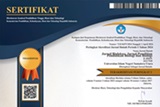Elementary students’ HOTS and attitude in environmental education: Sub topic of biology about disaster
Abstract
needs to be learned by elementary school students. The problem of this drought disaster has an impact on the sustainability of people's lives, including impacting elementary school students. Capabilities such as Higher Order Thinking Skills (HOTS) which are implemented in the form of an attitude of caring for the environment need to be developed. The purpose of this study was to describe HOTS scores and environmental care attitudes of elementary school students on the topic of drought and environmental care attitudes. The results of this study indicate that students' HOTS scores are still in the low category (27.70). As for the attitude of caring for the environment is in the moderate category (69.12). Environmental education needs to be developed to increase HOTS and environmental care attitudes related to drought disasters which have an impact on public health. The conclusion of this study is that students' HOTS scores are still in the low category and environmental care attitudes are still in the moderate category.
Keywords
Full Text:
PDFReferences
Aguilar-Salinas, W., Ojeda-Benitez, S., Cruz-Sotelo, S., & Castro-RodrÃguez, J. (2017). Model to Evaluate Pro-Environmental Consumer Practices. Environments, 4(1), 1–15. https://doi.org/10.3390/environments4010011
Anderson, L. W., Krathwohl, D. R., Airiasian, W., Cruikshank, K. A., Mayer, R. E., Pintrich, P. R., Raths, J., & Wittrock, M. C. (2001). A taxonomy for learning, teaching and assessing: A revision of bloom’s taxonomy of educational objectives. Longman.
Ballard, J., & Mooring, S. R. (2021). Cleaning Our World through Green Chemistry: Introducing High School Students to the Principles of Green Chemistry Using a Case-Based Learning Module. Journal of Chemical Education, 98(4), 1290–1295. https://doi.org/10.1021/acs.jchemed.9b00312
Berger, E., Carroll, M., Maybery, D., & Harrison, D. (2018). Disaster Impacts on Students and Staff from a Specialist, Trauma-Informed Australian School. Journal of Child and Adolescent Trauma, 11(4), 521–530. https://doi.org/10.1007/s40653-018-0228-6
Bevan, B. (2017). The promise and the promises of Making in science education. Studies in Science Education, 53(1), 75–103. https://doi.org/10.1080/03057267.2016.1275380
Buzov, I. (2014). Social network sites as area for students’ pro-environmental activities. Procedia - Social and Behavioral Sciences, 152, 1233–1236. https://doi.org/10.1016/j.sbspro.2014.09.304
Chierrito-Arruda, E., Rosa, A. L. M., de Souza Paccola, E. A., da Silva Macuch, R., & Grossi-Milani, R. (2018). Pro-environmental behavior and recycling: Literature review and policy considerations. Ambiente e Sociedade, 21. https://doi.org/10.1590/1809-4422ASOC0209R3VU18L4AO
Fitriani, U., Adisyahputra, A., & Komala, R. (2018). Eco-friendly website development in biology learning based on project activities on environmental pollution. Biosfer: Jurnal Pendidikan Biologi, 11(1), 32–46. https://doi.org/10.21009/biosferjpb.11-1.4
Gholamrezai, S., Aliabadi, V., & Ataei, P. (2021). Understanding the pro-environmental behavior among green poultry farmers: Application of behavioral theories. Environment, Development and Sustainability, 23(11), 16100–16118. https://doi.org/10.1007/s10668-021-01331-1
Glynn, S., Taasoobshirazi, G., & Fowler, S. (2007). Analogies: Explanatory tools in web-based science instruction. Educational Technology, 47(5), 45–50.
Haanpää, L. (2007). Consumers’ green commitment: Indication of a postmodern lifestyle? International Journal of Consumer Studies, 31(5), 478–486. https://doi.org/10.1111/j.1470-6431.2007.00598.x
Husamah, Fatmawati, D., & Setyawan, D. (2018a). OIDDE learning model: Improving higher order thinking skills of biology teacher candidates. International Journal of Instruction, 11(2), 249–264. https://doi.org/10.12973/iji.2018.11217a
Husamah, H., Fatmawati, D., & Setyawan, D. (2018b). OIDDE learning model: improving higher order thinking skills of biology teacher candidates. International Journal of Instruction, 11(2), 249–264. https://doi.org/10.12973/iji.2018.11217a
Li, X., Liu, Z., & Wuyun, T. (2022). Environmental Value and Pro-environmental Behavior Among Young Adults: The Mediating Role of Risk Perception and Moral Anger. Frontiers in Psychology, 13. https://doi.org/10.3389/fpsyg.2022.771421
Maryani, I., Prasetyo, Z. K., Wilujeng, I., & Purwanti, S. (2022). Promoting higher-order thinking skills during online learning: The integration of metacognition in science for higher education. International Journal of Evaluation and Research in Education, 11(4), 1980–1988. https://doi.org/10.11591/ijere.v11i4.23129
Meyer, A. (2016). Heterogeneity in the preferences and pro-environmental behavior of college students: The effects of years on campus, demographics, and external factors. Journal of Cleaner Production, 112, 3451–3463. https://doi.org/10.1016/j.jclepro.2015.10.133
Muhlisin, A. (2018). Analysis of students’response of the implementation of rms (reading, mind mapping, and sharing) learning model in philosophy of science. Unnes Science Education Journal, 7(1).
Muhlisin, A., Susilo, H., Amin, M., & Rohman, F. (2016). Improving critical thinking skills of college students through RMS model for learning basic concepts in science. Asia-Pacific Forum on Science Learning and Teaching, 17(1), 1–24. https://www.eduhk.hk/apfslt/download/v17_issue1_files/muhlisin.pdf
Nugraha, V. D., Muntholib, M., Joharmawan, R., Parlan, P., Yahmin, Y., & Su’Aidy, M. (2020). The development of the acid-base chemistry test oriented to higher order thinking skills for 11th grade students. AIP Conference Proceedings, 2215. https://doi.org/10.1063/5.0000546
Panno, A., Giacomantonio, M., Carrus, G., Maricchiolo, F., Pirchio, S., & Mannetti, L. (2018). Mindfulness, Pro-environmental Behavior, and Belief in Climate Change: The Mediating Role of Social Dominance. Environment and Behavior, 50(8), 864–888. https://doi.org/10.1177/0013916517718887
Shao, P. (2021). Effect of environmental education in universities on natural connection and pro-environmental behaviour. Journal of Environmental Protection and Ecology, 22(4), 1715–1722.
Sharpe, J., & Kelman, I. (2011). Improving the disaster-related component of secondary school geography education in England. International Research in Geographical and Environmental Education, 20(4), 327–343. https://doi.org/10.1080/10382046.2011.619810
Sheakley, M. L., Bauler, T. J., Vandre, D. D., Woodwyk, A., & Dickinson, B. L. (2019). Effectiveness of instructor-guided independent learning in comparison to traditional didactic lecture in the preclinical medical curriculum: A retrospective cohort study. Medical Teacher, 41(7), 795–801. https://doi.org/10.1080/0142159X.2019.1580355
Sigit, D. V., Miarsyah, M., Komala, R., Suryanda, A., Ichsan, I. Z., & Fadrikal, R. (2020). EECN: Analysis, potency, benefit for students knowledge and attitude to conserve mangroves and coral reefs. International Journal of Instruction, 13(1), 125–138. https://doi.org/10.29333/iji.2020.1318a
Utomo, A. P., Narulita, E., & Shimizu, K. (2018). Diversification of reasoning science test items of TIMSS grade 8 based on higher order thinking skills: A case study of Indonesian students. Journal of Baltic Science Education, 17(1), 152–161. https://www.scopus.com/inward/record.uri?eid=2-s2.0-85042747283&partnerID=40&md5=506d593e5a60deafe41afd916b68140b
Zaid, N. M., Yaacob, F. S., Shukor, N. A., Said, M. N. H. M., Mustaa’mal, A. H., & Rahmatina, D. (2018). Integration of peer instruction in online social network to enhance Higher Order Thinking skills. International Journal of Interactive Mobile Technologies, 12(8), 30–40. https://doi.org/10.3991/ijim.v12i8.9672
DOI: http://dx.doi.org/10.30821/biolokus.v6i1.2528
Refbacks
- There are currently no refbacks.
Copyright (c) 2023 Jurnal Biolokus: Jurnal Penelitian Pendidikan Biologi dan Biologi
indexed by :












